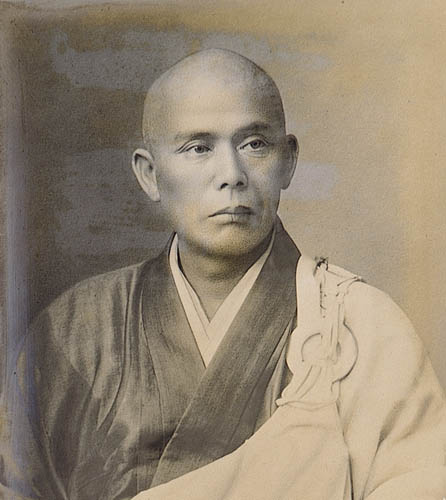- Soyen Shaku
Infobox Buddhist biography
name = Soyen Shaku

img_size =
img_capt =
landscape =
birth_name =
other_names =
dharma_name =
birth_date = 1859
birth_place = Kamakura,Japan
death_date =October 29 ,1919
death_place =
nationality =
denomination =
school =Rinzai
lineage =
title =Zen Master
workplace =
education =
occupation =
teacher =
reincarnation_of =
predecessor =Imakita Kosen
successor = Sokatsu Shaku
student =
spouse =
partner =
children =
website =Soyen Shaku (釈 宗演, 1859 –
October 29 ,1919 , Kamakura,Japan ; sometimes written as "Soen Shaku" or "Kogaku So’en Shaku") was the first Zen Buddhist master to teach in theUnited States . He was a Roshi of theRinzai school and was abbot of bothKencho-ji andEngaku-ji temples in Kamakura,Japan . Shaku was a disciple ofImakita Kosen .Soyen Shaku was an exceptional Zen monk. In his youth, his master, Kosen, and others had recognized him to be naturally advantaged. Three years after he had received “Dharma transmission” from Kosen at age 25, Soyen took the unique step of traveling to Ceylon to study Pali and Theravada Buddhism and live the alien life of the
bhikkhu for three years.In 1893 Shaku was one of four priests and two laymen composing the Japanese delegation that participated in the
World Parliament of Religions inChicago organized byJohn Henry Barrows and Paul Carus. He addressed the conference that September with a series of talks, notably aboutkarma ,nonviolence , an end to war, and tolerance of other religions.At this conference he met Dr. Paul Carus, a publisher from Open Court Press in La Salle, Illinois. Before Shaku returned to Japan, Carus asked him to send an English-speaker knowledgeable about Zen Buddhism to the United States. Shaku, upon returning to Japan asked his student and
Tokyo University scholar D. T. Suzuki to go to the United States, where he would eventually become the leading academic on Zen Buddhism in the West, and translator for Carus's publishing company.Despite his anti-war statements, Soyen served as a chaplain to the Japanese army during the
Russo-Japanese War , which he believed to be a just cause. In 1904, theRussia n author and pacifistLeo Tolstoy wrote Shaku in the hopes that he would join him in denouncing the war. Shaku refused, concluding that "... as a means of bringing into harmony those things which are incompatible, killing and war are necessary." (quoted in Victoria, 1997) After the war, Shaku would attribute Japan's victory to itssamurai culture, which he traced back to the nation's amalgamation of Buddhism,Confucianism , andShinto .In 1905, Soyen Shaku returned to America to help establish Zen in the West, staying for roughly one year in
San Francisco andSeattle . Shortly after arriving, he was joined by his studentNyogen Senzaki . Ultimately, Senzaki would became a permanent resident and Zen teacher inLos Angeles .Soyen Shaku died
29 October ,1919 in Kamakura.__NOTOC__ee also
*
Buddhism in America
*Buddhism in Japan
*List of Rinzai Buddhists
*Timeline of Zen Buddhism in the United States Selected Works (in English)
* "Sermons of a Buddhist Abbot: A Classic of American Buddhism", Three Leaves, 2004. ISBN 0-3855-1048-9
* "Zen for Americans"References
*cite book|author=Victoria, Brian|title=
Zen at War |publisher=Weatherhill|year=1997|id=ISBN 0-8348-0405-0External links
* [http://www.china1900.info/gedanken/wpr05.htm Shaku Soyen: Arbitration Instead of War] Comments from the World Parliament of Religion, September 1893
Wikimedia Foundation. 2010.
